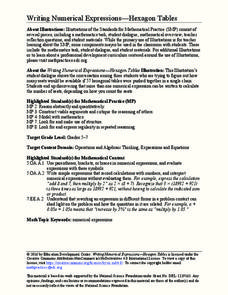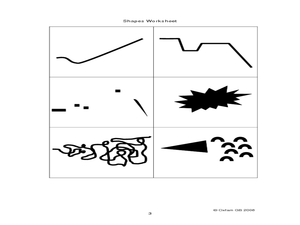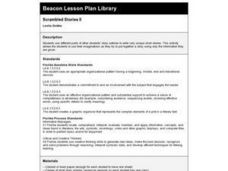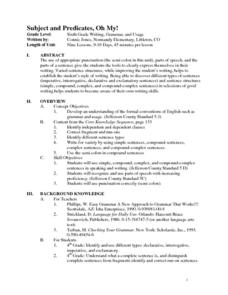EngageNY
Algebraic Expressions—The Distributive Property
Do your classes truly understand the distributive property? Use a demonstrative lesson to represent the distributive property in various ways. Learners solidify understanding by creating a geometric pattern for distributive property, and...
Utah Education Network (UEN)
8th Grade Poetry: Sonnet Poem
The third lesson of five in an eighth-grade poetry unit has young scholars comparing Shakespearean sonnets with Petrarchan sonnets. To begin, they examine the different structures of the two forms and their different rhyme schemes. After...
Education Development Center
Writing Numerical Expressions—Hexagon Tables
Explore a basic pattern to practice writing expressions. In collaborative groups, learners examine a contextual pattern and write an expression to model it. The task encourages groups to describe the pattern in multiple ways.
Curated OER
Joining Sentences
Sentence combining meets multiple objectives for writers, and they are all available in this informational text exercise. Learners read a mixed-up excerpt about the history of chess, putting 15 sentences into logical order. Have a...
Winterhill School
Poetry Analysis
Gain greater insight into poems using a poetry analysis learning exercise. Here, scholars follow steps and answer questions to dissect any poem. Topics include the poem's meaning, theme, technique, and structure, as well as personal...
Noyce Foundation
Miles of Tiles
Create number sentences and equations to solve geometric problems. Each activity in the series of five asks young mathematicians to consider different-sized tiles to build structures according to specific criteria. The first activities,...
American Museum of Natural History
Grow Rock Candy
The best way to study crystals is to make your own! A hands-on lesson shows learners how to make their own rock candy from household materials. While they watch the crystals grow, they discover their structure and can even eat their...
Biology Junction
Plasma Membrane – Gateway to the Cell
Just as skin covers your body limiting what can go in and out, plasma membranes cover cells to do the same. Scholars begin with a presentation that gives overview of the structure and function of plasma membranes. Then, they learn how...
Curated OER
VCe Rule Accuracy
Explore word structure by participating in a vowels and consonants activity with young readers. They will read words their teacher points out in class and pronounce them correctly. Then they identify the words they say which have a...
Curated OER
Text Structures in Science Writing
Students recognize that science writing is organized in identifiable patterns called text structures. Understanding and using these different text structures help refine students' abilities to read and write in science.
Curated OER
Plant Structure and Growth
This plant structure and function PowerPoint addresses the main organs and the factors that affect its development as well as going into detail about the specializations at a cellular level. The cell functions and system adaptations...
Curated OER
Atomic Structure - Part A
Students describe the structure of atoms, including the particles that make them up. They recognize that key scientists and experiments have contributed to the changes
in the Atomic Theory.
Curated OER
Global Music Patterns- Islamic Art
Young scholars compose music using Islamic patterns. In this cultural arts lesson, students examine Islamic art and analyze the patterns. Young scholars incorporate various Islamic patterns into a musical composition.
Curated OER
Inheritance Patterns in Zorks
In this inheritance patterns worksheet, students create a visual of a Zork using chromosome strips to represent alleles from the father and the mother to determine the traits in the offspring. Students translate the genotype to the...
Curated OER
The "Write" Stuff: Strategies and Conventions for Imaginative Writing
A comprehensive and immersive series of lessons that examines various aspects of story development leads learners into writing a narrative of their own. Writers develop an understanding of the writing process as they use the learning...
Curated OER
Dear Diary
Work on narrative writing with this lesson, in which middle schoolers analyze the characters from a selected piece of literature and write narrative diary pieces as the character. They work to understand the point of view of the...
Curated OER
Finding Addition Patterns
Students practice finding the sums of two-one digit numbers. For this addition lesson plan, students also record facts onto an addition chart.
Curated OER
Pattern And Design in Nature
Young scholars observe natural objects carefully and note intricate design and structure beyond surface form.
Curated OER
Paper Clay Leaves
Using real leaves to imprint clay, your class will see a natural effect on their individual projects. This is a fabulous way to study leaf anatomy in science. Or, you can focus on mixing colors to recreate the original. These leaves can...
New South Wales Department of Education
Plant Features
Pine needles are actually modified leaves. In the 16th installment of 20, young scientists explore plants. Through an analysis of leaves — shape, veins, and edges — pupils see how to classify plants based on structural features.
Illustrative Mathematics
Kitchen Floor Tiles
An interesting way to look at the kitchen floor is to count the number of tiles in the border. Fred starts with four white floor tiles and writes an expression for the number of tiles needed for the colored border. Algebra learners are...
Curated OER
Scrambled Stories II
Review story elements with your class. They will use examples from a story to develop critical-thinking questions. Then they use a graphic organizer to describe the setting, character, and plot of the story, focusing on how they...
Curated OER
Subject and Predicates, Oh My!
Eliminate all doubt when it comes to sentence structure with nine thorough lesson plans. Whether you want your young writers to vary their sentence structure or shore up their knowledge of conjunctions and semicolons, these lessons are a...
EngageNY
Multiplying and Factoring Polynomial Expressions (part 2)
If you can multiply binomials, you can factor trinomials! This is the premise for a instructional activity on factoring. Pupils look for patterns in the binomials they multiply and apply them in reverse. Examples include leading...
Other popular searches
- Identify Structural Patterns
- Structural Patterns in Words
- Structural Patterns in Reading
- Structural Patterns in Books
- Teach Structural Patterns
- Word Structural Patterns

























